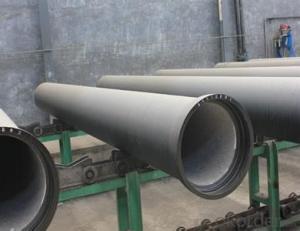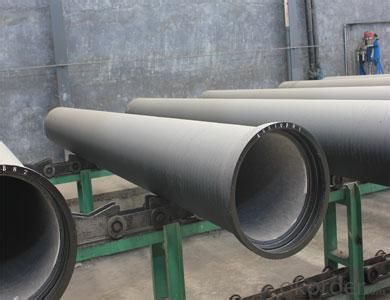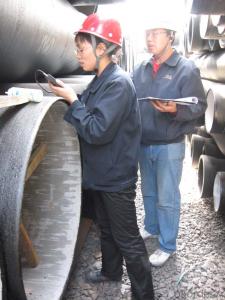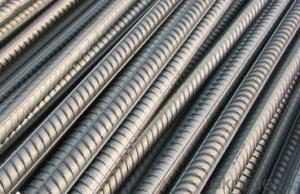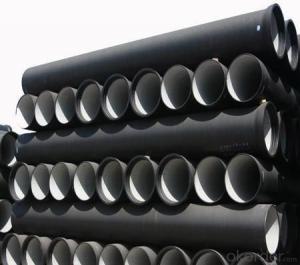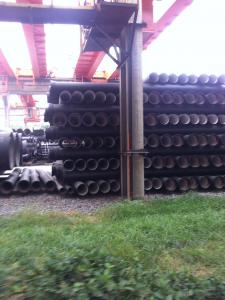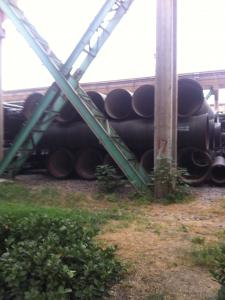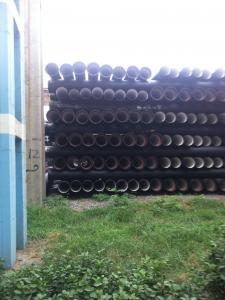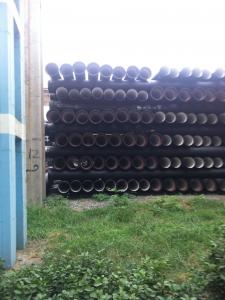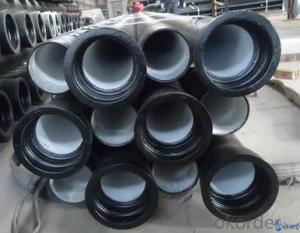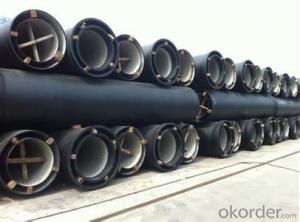DUCTILE IRON PIPES AND PIPE FITTINGS K9 CLASS DN150
- Loading Port:
- Tianjin
- Payment Terms:
- TT OR LC
- Min Order Qty:
- 22 pc
- Supply Capability:
- 3000 pc/month
OKorder Service Pledge
OKorder Financial Service
You Might Also Like
Material : Ductile Cast Iron
Size Range : DN 80mm to DN 2000mm
Unit Effective Length : 6m or 5.7m
Manufacture Standard: ISO 2531:1998/ EN 545:2006/EN 598:2007
Annual capacity : 200,000 tons
Coating Exterior: Zinc 130g/m2 according to ISO 8179-1 and bitumen coating 70 microns.
Cement Interior: Portland Cement/ High Alumina Cement/ Sulphate Resisting Cement Lining according to ISO 4179
Special requirements on external coating and internal lining can be applied
We also provide accessories such as SBR/EPDM rubber gaskets, lubricant paste, pipe caps, PE sleeves, etc.
Additional Parts:
Each pipe is strictly inspected according to related standard to ensure permanently high performance.
Easy Installation at site and service free for life
Long Service Lifespan
Quotation will arrive you within 24hours once we get your inquiry.
We guarantee offering you a competitive price.
A copy of original inspection reports of pipes will be offered after shipment.
Photos of loading process will be sent to the customer after shipment effect.
We will follow-up the delivery progress after shipment effect and update to the customer on weekly basis.
- Q: Are ductile iron pipes suitable for landfill leachate collection?
- Yes, ductile iron pipes are suitable for landfill leachate collection. Ductile iron pipes have excellent strength and durability, making them capable of withstanding the harsh and corrosive nature of landfill leachate. Additionally, they have a long lifespan and are resistant to both external and internal corrosion, making them a reliable choice for this application.
- Q: Are ductile iron pipes resistant to hydrostatic pressure?
- Yes, ductile iron pipes are resistant to hydrostatic pressure. Ductile iron is a type of cast iron that is known for its strength and durability. It has excellent mechanical properties, including high tensile strength and elasticity, which enable it to withstand high levels of hydrostatic pressure. This makes ductile iron pipes well-suited for applications where water or other fluids need to be transported under pressure, such as in water distribution systems, sewer lines, and industrial pipelines. Additionally, ductile iron pipes have a high resistance to corrosion, which further enhances their ability to withstand hydrostatic pressure and ensures their long-term performance and reliability.
- Q: Are ductile iron pipes suitable for installation in areas with high seismic activity?
- Areas with high seismic activity are well-suited for the installation of ductile iron pipes. Their ability to withstand external loads and ground movement is a key advantage, making them ideal for seismic zones. In fact, these pipes possess excellent flexibility and high tensile strength, enabling them to endure ground shifting and seismic forces without breaking or fracturing. Additionally, their high resistance to impact and stress decreases their vulnerability to damage during seismic events. Furthermore, the performance of ductile iron pipes in seismic areas has been extensively demonstrated. They have been successfully implemented and utilized in earthquake-prone regions worldwide for numerous years, showcasing their capacity to endure ground movements caused by seismic activity without jeopardizing their structural integrity. Moreover, ductile iron pipes offer the added benefit of being highly durable and long-lasting, which is vital in high seismic areas where infrastructure must withstand frequent ground movements. Their extended lifespan reduces the necessity for frequent maintenance and replacement, resulting in a cost-effective option in the long term. However, it is crucial to note that proper installation techniques and adherence to seismic design guidelines are imperative to ensure optimal performance of ductile iron pipes in high seismic areas. Consulting experienced engineers and adhering to local building codes and regulations is recommended to guarantee correct installation and the ability to withstand the specific seismic conditions of the area. Overall, due to their flexibility, strength, durability, and proven performance, ductile iron pipes are regarded as a suitable choice for installation in areas with high seismic activity.
- Q: Are ductile iron pipes suitable for mining applications?
- Ductile iron pipes are indeed suitable for mining applications. This type of cast iron has undergone treatment to enhance its strength, durability, and ductility. Notably, these pipes possess high tensile strength and corrosion resistance, making them an ideal choice for underground mining operations that face harsh conditions. The ability of ductile iron pipes to withstand high pressure and heavy loads is one of their key advantages in mining applications. They exhibit excellent structural integrity and can withstand both internal and external forces, ensuring reliable performance in demanding mining environments. Moreover, ductile iron pipes have a long service life and require minimal maintenance. They offer exceptional resistance to abrasion, which is extremely important in mining operations where abrasive materials such as rocks, minerals, and ores are prevalent. Additionally, the smooth inner surface of these pipes minimizes friction, allowing for efficient transportation of mining materials. Furthermore, ductile iron pipes are a cost-effective option compared to alternatives like steel or concrete. They have a lower upfront cost and require less frequent replacements, resulting in reduced long-term expenses for mining companies. In conclusion, ductile iron pipes are highly suitable for mining applications due to their strength, durability, resistance to corrosion and abrasion, long service life, and cost-effectiveness. These pipes ensure reliable and efficient transportation of mining materials, thereby contributing to the overall efficiency and productivity of mining operations.
- Q: What are the requirements for the hydrostatic test of ductile iron pipes?
- The hydraulic pressure test shall be carried out in the backfill before trying to allow the pressure after passing the backfill, backfill, the graded gravel fill to 300mm above the top of pipe, and then the soil backfill, backfill process by 200~300 tamped pipeline above 500mm within more than 500 can be used in artificial ramming, mechanical compaction. The degree of compaction shall not be less than 0.93.
- Q: How is ductile iron pipe installed?
- Ductile iron pipe is typically installed using the trenchless method, which involves three main steps: preparation, installation, and backfilling. First, the trench is excavated and prepared with a proper foundation for the pipe. Then, the ductile iron pipe is carefully lowered into the trench using specialized equipment and joined together using mechanical joints or flanged connections. Finally, the trench is backfilled with suitable material and compacted to provide stability and support to the installed pipe.
- Q: How do ductile iron pipes handle heavy traffic loads?
- Ductile iron pipes are known for their exceptional strength and durability, making them well-suited to handle heavy traffic loads. Their high tensile strength and resistance to cracking or breaking under pressure allow them to withstand the weight and stress generated by heavy traffic. Additionally, the flexible nature of ductile iron allows it to absorb and distribute the load, reducing the risk of damage or failure. Overall, ductile iron pipes are a reliable choice for handling heavy traffic loads in various infrastructure systems.
- Q: Can ductile iron pipes be used for irrigation of sports fields?
- Yes, ductile iron pipes can be used for irrigation of sports fields. Ductile iron pipes are known for their durability, strength, and corrosion resistance, making them suitable for various applications, including irrigation. They can effectively transport water over long distances and withstand the pressure required for irrigation systems. Additionally, ductile iron pipes have a long lifespan, reducing the need for frequent replacements and ensuring reliable irrigation for sports fields.
- Q: What are the common causes of failure in ductile iron pipes?
- The common causes of failure in ductile iron pipes include corrosion, external loading, ground movement, manufacturing defects, and improper installation or maintenance.
- Q: Are ductile iron pipes suitable for use in cooling water systems?
- Yes, ductile iron pipes are suitable for use in cooling water systems. They offer excellent strength, durability, and corrosion resistance, making them ideal for transporting water at varying temperatures. Additionally, their flexibility allows them to withstand pressure and temperature changes, ensuring long-lasting and reliable performance in cooling water applications.
Send your message to us
DUCTILE IRON PIPES AND PIPE FITTINGS K9 CLASS DN150
- Loading Port:
- Tianjin
- Payment Terms:
- TT OR LC
- Min Order Qty:
- 22 pc
- Supply Capability:
- 3000 pc/month
OKorder Service Pledge
OKorder Financial Service
Similar products
Hot products
Hot Searches
Related keywords
